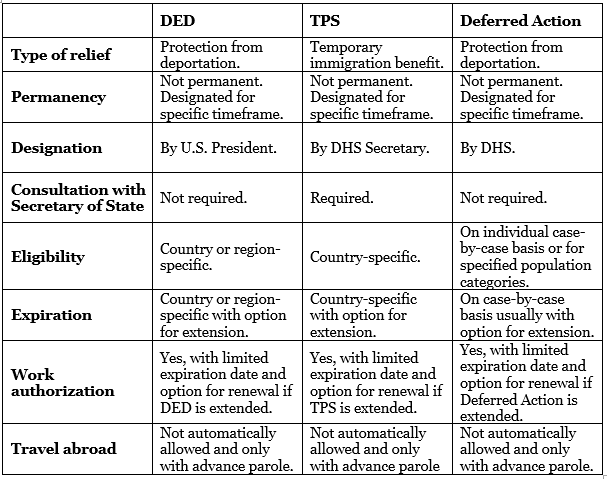What is Deferred Enforced Departure?
A form of relief from removal. Deferred Enforced Departure (DED) (formerly Extended Voluntary Departure) allows certain individuals from designated countries and regions facing political or civic conflict or natural disaster to stay in the United States.
DED is a temporary immigration benefit. It provides an administrative stay of removal designated for specific period of time.
Which countries are currently designated for DED?
Because these countries have only recently been designated for DED, the USCIS website has not yet been updated and does not provide information on how eligible individuals can apply, and a notice will need to be posted in the Federal Register implementing these memos.
1) Liberia. On January 20, 2021, President Joe Biden issued a proclamation reinstating DED. The proclamation has been posted in the Federal Register and it extended DED and work authorization until June 30, 2022, for Liberians who had DED protections that expired on January 10, 2021. Previously, President Donald Trump had extended DED for Liberians until January 10, 2021 following the enactment of the National Defense Authorization Act (NDAA) in December 2019. The NDAA included a Liberian Refugee Immigration Fairness (LRIF) provision making certain Liberians eligible to apply for lawful permanent resident status (LPR) until December 20, 2020. Congress extended the LRIF deadline by one year to December 20, 2021 in section 901 of the Consolidated Appropriations Act, 2021 (Public Law 116-260).Those who applied and were denied for LRIF are not covered under the DED extension.
On March 27, 2018, President Trump had issued a memorandum directing DHS to start a 12-month wind-down period of DED for Liberia, but eventually extended DED protections twice during his administration. President George W. Bush initially granted DED to about 10,000 Liberians in the U.S. after their TPS expired in 2007.
2) Venezuela. On January 19, 2021, President Trump issued a memorandum granting DED and work authorization to Venezuelans residing in the U.S. as of January 20, 2021 for a period of 18 months, through July 20, 2022.
How many people currently hold DED?
1) Liberians – estimates range up to 3,600. While the actual number of Liberian DED holders is unclear, U.S. Citizenship and Immigration Services (USCIS) estimates about 3,600 Liberians were TPS holders at the time DHS terminated their status in 2007. As of October 2020, data from USCIS shows that 2,532 Liberians have applied for lawful permanent resident status under the LRIF provision. Only Liberians who held TPS before its termination are eligible for DED.
2) Venezuelans – estimates ranges from 94,000 to 200,000. While the actual number of Venezuelans impacted by DED is unclear, there were about 94,000 Venezuelan nationals in the U.S. without authorization as of 2018. This number, however, does not include all Venezuelans as information is not collected at all ports of entry. In a report analyzing the impact of the proposed Venezuelan TPS Act of 2019, the Congressional Budget Office (CBO) estimated about 200,000 Venezuelans would be eligible for TPS protection, which would likely be the same number protected by DED.
Who designates countries for DED?
The President. The President of the United States has the discretion to designate countries or regions for DED as part of the president’s power to conduct foreign relations. The president generally grants DED, which has no statutory basis, by issuing a presidential directive through an executive order or presidential memorandum.
Who is eligible for DED?
Individuals meeting the criteria in the president’s directive. Eligibility criteria for DED are country or region-specific areas set forth in the president’s directive together with any additional requirements issued by the Department of Homeland Security (DHS). The eligibility criteria typically include demonstration of continuous presence in the U.S. since a specific date.
How long do individuals generally receive DED?
It depends on each country’s or region’s designation. The president establishes the initial time frame for DED and may decide to extend the protection before its expiration date.
Are DED holders allowed to work?
Yes. The president’s directive can provide individuals, eligible for DED, work authorization.
Can DED holders travel abroad?
Not without advance parole. While the presidential directive may include travel authorization, currently DED holders must file and be approved for advance parole if they want to travel abroad. Advance parole is a travel document that allows individuals who do not have a visa to be readmitted to the U.S. after travelling abroad during a specific approved time period.
Does DED differ from Temporary Protected Status (TPS) and deferred action?
Yes. The following table summarizes the differences between DED, TPS and deferred action:

Which other countries or regions were previously granted DED?
China, Persian Gulf, El Salvador and Haiti. DED was first granted in 1990 and has been granted five times to provide an administrative stay of removal for certain individuals from China, the Persian Gulf, El Salvador, Haiti and Liberia.


